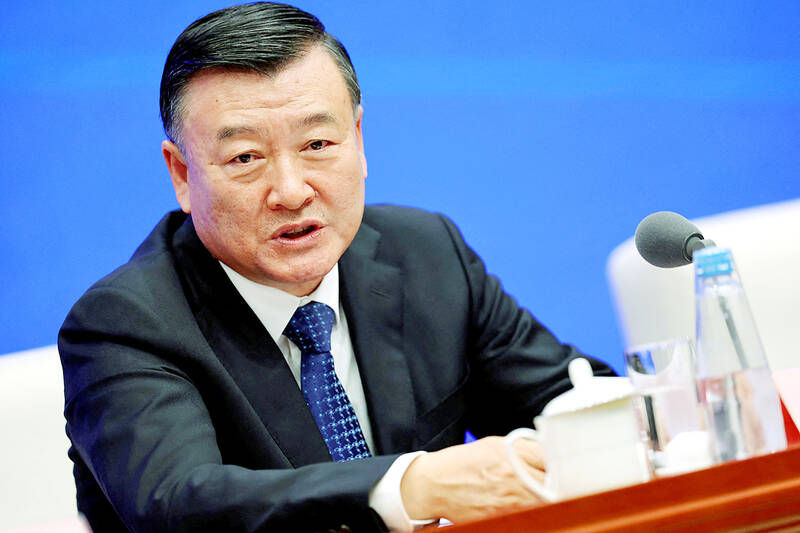China yesterday said that it would boost credit available for unfinished housing projects to more than US$500 billion as it unveiled another round of measures to shore up the sector and try to reignite the economy.
The real-estate sector has long accounted for about one-quarter of GDP and experienced dazzling growth for two decades, but a years-long housing slump has battered growth.
Chinese Minister of Housing and Urban-Rural Development Ni Hong (倪虹) at a news conference offered fresh help, saying Beijing would “increase the credit scale of white-list projects to 4 trillion” yuan (US$562 billion) by the end of the year, up from more than 2 trillion yuan.

Photo: Reuters
The “white list” scheme, announced earlier this year, pushes local authorities to recommend housing projects for financial support and work with banks to ensure their completion.
“The urban real-estate financing coordination mechanism should strive to include all eligible real-estate projects in the white list,” Ni said. “An additional 1 million worn-out homes ... will be renovated.”
The move would “be conducive to absorbing the existing stock of commercial housing,” he said.
China’s leadership last month unveiled a raft of stimulus in one of the biggest drives to boost growth for years. Among the measures were a string of interest rate cuts, the loosening of restrictions on buying homes and moves to free up cash for banks to lend more.
Beijing yesterday said it estimated that “existing mortgage rates will fall by an average of about 0.5 percentage points” under those cuts.
That would “save 150 billion yuan in interest expenditure overall, benefiting 50 million families and 150 million residents,” People’s Bank of China Deputy Governor Tao Ling (陶玲) said.
Several major cities have also eased restrictions on buying homes — most recently in Chengdu and the northern port city of Tianjin.
Stocks in Shanghai and Hong Kong slipped yesterday as traders shrugged at Beijing’s latest plan to boost the nation’s troubled property sector, which came up short of expectations.
“They’re still trying to talk the talk, with more noise about stabilizing the property market,” SPI Asset Management managing partner Stephen Innes said. “As the briefing rolled on, it was clear: traders were not thrilled.”
“Let’s be honest, though — China’s property mess isn’t something that can be patched up with a few speeches and half-baked measures,” he said.
Hong Kong’s Hang Seng Index closed down 1.0 percent at 20,079.10, while the Shanghai Composite Index was down 1.1 percent at 3,169.38.

Real estate agent and property developer JSL Construction & Development Co (愛山林) led the average compensation rankings among companies listed on the Taiwan Stock Exchange (TWSE) last year, while contract chipmaker Taiwan Semiconductor Manufacturing Co (TSMC, 台積電) finished 14th. JSL Construction paid its employees total average compensation of NT$4.78 million (US$159,701), down 13.5 percent from a year earlier, but still ahead of the most profitable listed tech giants, including TSMC, TWSE data showed. Last year, the average compensation (which includes salary, overtime, bonuses and allowances) paid by TSMC rose 21.6 percent to reach about NT$3.33 million, lifting its ranking by 10 notches

Popular vape brands such as Geek Bar might get more expensive in the US — if you can find them at all. Shipments of vapes from China to the US ground to a near halt last month from a year ago, official data showed, hit by US President Donald Trump’s tariffs and a crackdown on unauthorized e-cigarettes in the world’s biggest market for smoking alternatives. That includes Geek Bar, a brand of flavored vapes that is not authorized to sell in the US, but which had been widely available due to porous import controls. One retailer, who asked not to be named, because

SEASONAL WEAKNESS: The combined revenue of the top 10 foundries fell 5.4%, but rush orders and China’s subsidies partially offset slowing demand Taiwan Semiconductor Manufacturing Co (TSMC, 台積電) further solidified its dominance in the global wafer foundry business in the first quarter of this year, remaining far ahead of its closest rival, Samsung Electronics Co, TrendForce Corp (集邦科技) said yesterday. TSMC posted US$25.52 billion in sales in the January-to-March period, down 5 percent from the previous quarter, but its market share rose from 67.1 percent the previous quarter to 67.6 percent, TrendForce said in a report. While smartphone-related wafer shipments declined in the first quarter due to seasonal factors, solid demand for artificial intelligence (AI) and high-performance computing (HPC) devices and urgent TV-related orders

MINERAL DIPLOMACY: The Chinese commerce ministry said it approved applications for the export of rare earths in a move that could help ease US-China trade tensions Chinese Vice Premier He Lifeng (何立峰) is today to meet a US delegation for talks in the UK, Beijing announced on Saturday amid a fragile truce in the trade dispute between the two powers. He is to visit the UK from yesterday to Friday at the invitation of the British government, the Chinese Ministry of Foreign Affairs said in a statement. He and US representatives are to cochair the first meeting of the US-China economic and trade consultation mechanism, it said. US President Donald Trump on Friday announced that a new round of trade talks with China would start in London beginning today,